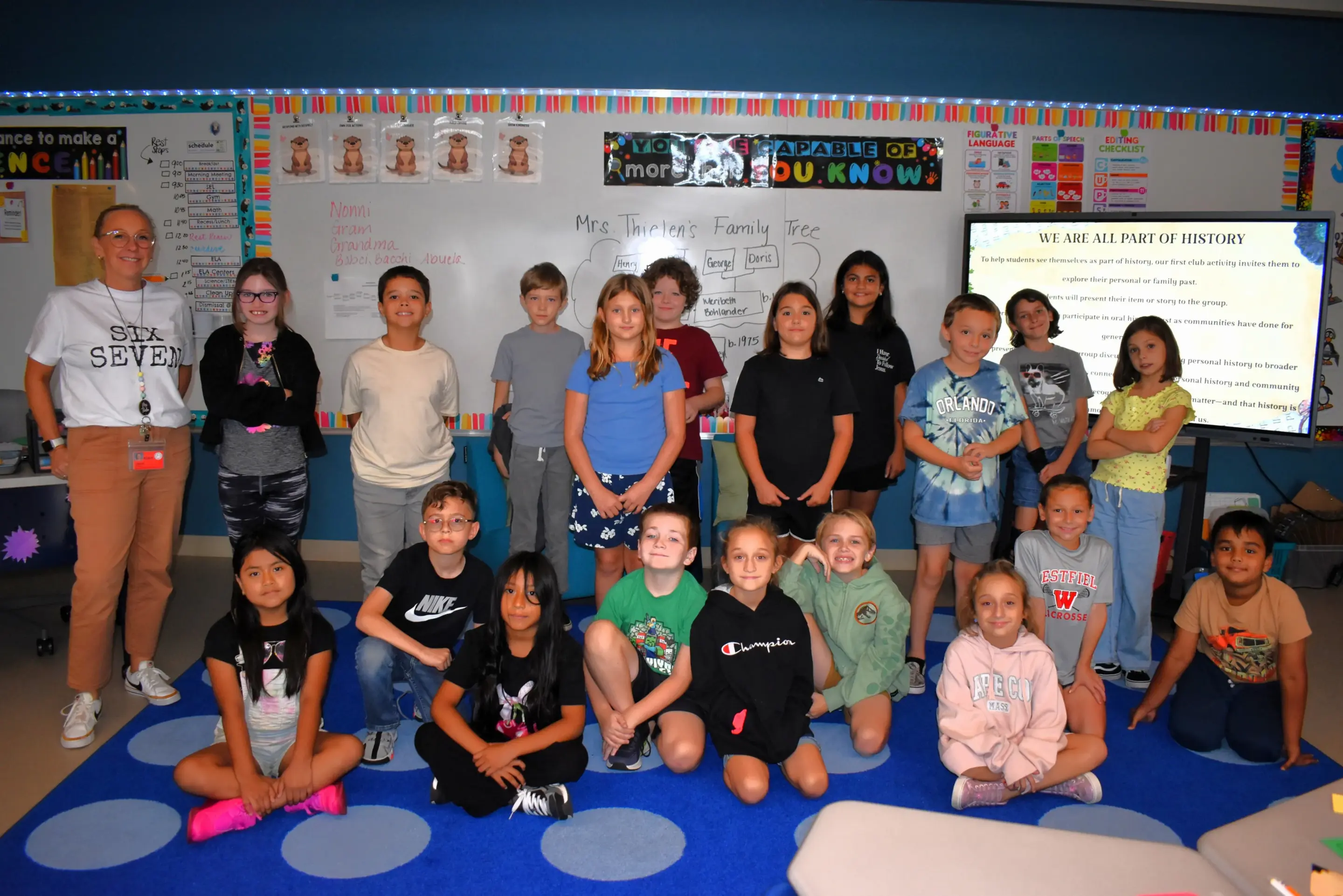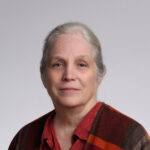The third and fourth graders in the newly-former Young Historians Club at Westfield River Elementary, led by teacher Jennifer Thielen, a member of the Westfield Historical Commission.
Reminder Publishing photo by Amy Porter
WESTFIELD — On Oct. 6, the School Committee was treated to a presentation by third and fourth grade members of the newly-formed Young Historians Club at Westfield River Elementary School.
Their teacher Jennifer Thielen, a member of the Westfield Historical Commission, said the club was designed to make history personal and meaningful, and to celebrate Westfield’s role in the 250th anniversary of the American Revolution — its semiquincentennial, a word her students are learning.
Thielen said the club’s first activity is to help students see themselves as part of history, and share their own personal or family pasts to connect them to the broader community theme.
She said by sharing, they actively participate in oral history, just as communities have done for generations. “Your stories matter. History is not just about famous figures,” Thielen said.
She then introduced several of the 20 or more students in the club to share some of their own family history with the School Committee.
Luna said her family history is about her family’s restaurant, Santiago’s, in Westfield. “My great grandparents started the restaurant. It serves Puerto Rican food, because my great grandparents are from Puerto Rico,” Luna said, explaining that the restaurant serves rice and beans — her own favorite, and empanadas. She said her great grandparents arrived here at 17. When they started the restaurant in 2000, her great grandfather kept Puerto Rican history alive by passing down recipes and music to four generations.
Joan brought her Crockett family cookbook. She said Davy Crockett is a distant relative of hers. She said in the cookbook are recipes from Great Grandma Crockett and Great Grandpa Crockett and other family members. She said her favorite recipe from the cookbook is German pancakes.
Other students brought photos and mementos of their grandparents in the armed services. One brought a Navy shirt from her grandfather’s service on the flight deck of the USS Guadalcanal, and another, a photograph of her grandfather John from his longtime service in the Air Force. Another student brought her grandfather’s gold badge that he earned as a police officer in Springfield for 40 years, which Mayor Michael McCabe checked out after the presentation.
Nikki brought brag tags from Fort Meadow. “We were given them when we did good things.” She said she went to Fort Meadow starting when she was 3, for two years, and showed the school’s mascot, Cubby. “Fort Meadow was very important to me. I learned the alphabet, counting and writing. It’s where I learned that I love school,” Nikki said.
Mason, who had to take a few deep breaths before speaking to the committee, talked about his mother’s ancestry. He said her grandfather’s DNA was from Germany, Scotland, Ireland, France, eastern Europe, Russia and the Balkans. He showed a picture of his great grandma Nonny with his mother and two sisters when she was very young, and another picture with his great grandpa Poppy and his mom, sister and cousin. “Now everyone is all grown up.”
Mason said his mom was very close to her grandparents in the Dominican Republic. “Growing up for both of my parents was difficult. My mom worked hard and is now a daycare provider. My favorite family traditions are going camping, baking pumpkins and carving them out for Halloween, celebrating birthdays, and playing baseball just like all my older cousins did,” he said.
Patrick brought photos of his great grandparents Jack and Ellie. “To me they are Nana and Bup.” He said Bup served in the Korean War, and as a pharmacist on Elm Street in Westfield. His nana was a home economics teacher at Westfield High School, who taught former band director Tom Gannon, among others. “Bup passed away a few years ago, but I am happy that Nana is able to share her history with me at 93 years,” Patrick said.
Christopher talked about his great grandmother Bopshi who lived through very hard times in Poland during the Nazi takeover. He said due to the war, she didn’t have a chance for an education, but always believed in the importance of learning and wanted her children and great grandchildren to have that opportunity. He said after the war, she applied for the lottery to come to America and waited 10 years to be chosen, keeping the piece of paper safely in a box, even when it was getting chewed up by bugs. When her number was chosen, she brought the paper to the embassy for tickets to America, and came over in 1954 alone, leaving her husband and four children behind, until she could work and send enough money to bring them over.
“Because of her courage and sacrifice, I get to stand here, go to school, and take advantage of the education she dreamed for us. Her story inspires me to work hard and never take my opportunities for granted,” Christopher said.
Genesis talked about when she came here with her family from Ecuador. “We came because there wasn’t a lot of work, and because there was a lot of robbery going on. It took us one month to get here. For four days, we lived under a bridge. We had to sleep on rocks, and only got water and tacos to eat and some cookies. It was cold at night, but we were still brave to live under the bridge,” she said.
The School Committee applauded after each student spoke. “I am super impressed that they were able to come up here and be brave and read big words and talk about hard things,” Thielen said, before all of the students in unison thanked the committee for having them come and speak.
The Young Historian’s Club meets twice a month. At its first official meeting, Thielen showed the students how to create a family tree, and asked them to bring them home for help with names.
She also thanked Curriculum Director Susan Dargie for helping them to form the club and get a civics project grant. Future plans for the club include guest speakers, live demonstrations and walking field trips.


